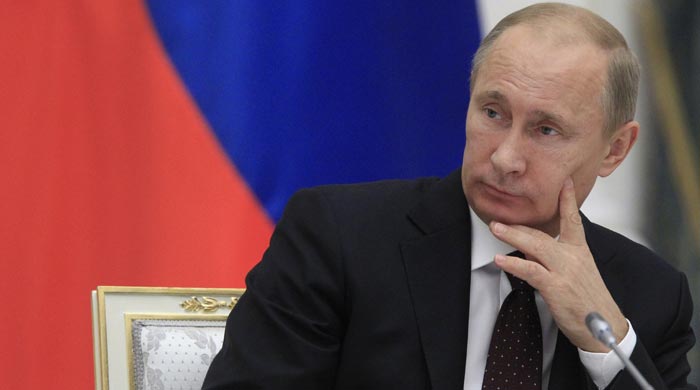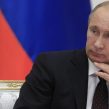
Putin Looks for an Escape from the Dead End of His Presidency
Publication: Eurasia Daily Monitor Volume: 10 Issue: 40
By:

The end of a full year after Vladimir Putin was elected president on March 4, 2012, coincided very closely with the 60th anniversary of Josef Stalin’s death, which greatly shocked the traumatized Soviet society of 1953 but never became sufficient closure to the era of terror and totalitarian mobilization. A stream of jubilee commentary has recently been examining the lasting legacy of Stalinism to the Russian public longing for “firm-hand” paternalism. But it is even more striking how this legacy is organic to the substance and style of Putin’s regime, which seeks to subjugate every aspect of social life to central control and even insists on adopting a school history textbook that would be free from contradictions (Colta.ru, February 28). Increasingly, this cultural congruence is sharply rejected by the old liberal intelligentsia and the new “creative classes”—forcing the anti-modern Putinism on the defensive. While a solid majority of Russians see Putin as personally responsible for the plight of the country, his approval ratings—something Stalin never had to be concerned about—are steadily dropping (Moskovsky Komsomolets, March 1; Levada.ru, February 28).
Putin expected the unwavering admiration of the “masses” and cannot figure out why this has not materialized during his presidency. Nonetheless, he has grasped the need to regain control over the country’s unexpectedly turbulent political agenda. He has initiated so many pieces of legislation and public debates that the opposition’s Coordination Council feels hard pressed to respond to so many simultaneous attacks on liberal values, while the elites are puzzled about the real intentions behind the campaign for “repatriating” their fortunes (Novaya Gazeta, February 26). In this chaotic slide toward a quasi–patriotic police state, legislation on changing the order of electing the State Duma, introduced by Putin last Friday—cancelling the draft bill proposed a year ago by then-President Dmitry Medvedev—may have particular significance (Kommersant, March 1). It only makes sense to push such an initiative if Putin has opted to dismiss the compromised Duma and stage new elections, in which the corruption-mired United Russia party would contest only half of the seats, while the Putin-led People’s Front would capture most of the other half in single-member constituencies (RIA Novosti, Gazeta.ru, March 1).
The rush toward such a political coup may appear out of character for Putin—who champions stability above all else—but his acute political instincts are likely warning him that time is running out. The economy is obviously slowing down. Yet, what is deeply disturbing for the Kremlin is the fact that the sustained effort at ensuring increases in salaries and pensions during the period of extra-slow growth fails to bring any positive response from the electorate (Forbes.ru, February 28). Issues pertaining to health care, education and housing have become more important for expanding the lower-middle classes than minor income increases. Nevertheless, Putin refuses to believe that his strict orders to check the escalation of communal costs would fail to have any effect (Gazeta.ru, February 28). He needs an economic miracle, and advisors like Sergei Glazyev promise him one by the simple means of centralized planning and investing petro-revenues in re-industrialization—but that would require a massive assault on too many “special friends” who have lobbied for the further privatization of state assets (Nezavisimaya Gazeta, March 1).
One part of this coveted miracle, which answers best to the Stalinist baggage that Putin’s regime reverently carries, is re-armament. Yet, the expected positive effect from directing colossal investments toward acquisitions of every item on the military menu is spoiled by the series of corruption scandals centered on former Defense Minister Anatoly Serdyukov. He is the only high-level official targeted in the latest round of wide-ranging anti-corruption probes, and many bureaucrats are anxiously following his stubborn refusal to cooperate with the investigation, which every week adds new “episodes” (Novaya Gazeta, February 25). Speaking last week before the military top brass, Putin did not mention corruption at all but urged them to continue with reforms, which according to him require only “fine polishing” (Kommersant, February 28). Defense Minister Sergei Shoigu was far more critical about Serdyukov’s blunders but was careful to avoid picking fights with the industrial lobbies, mentioning only briefly their staggering manipulations of prices (Ezhednevny Zhurnal, March 1). The defense ministry head tries to focus on the army’s manpower crisis, but the heavy tilt of budget priorities toward rearmament leaves him with few options to advance a professionalization of the “big battalions,” which are poorly trained and badly under strength.
In the best Stalinist tradition, the proudly displayed Russian military might, even if only virtual, is supposed to constitute the foundation of a self-assertive foreign policy. Indeed, opinion polls show that among a list of Putin’s achievements, respondents most often agree that he “restored Russia’s status as a great power” (Polit.ru, February 28). Business elites, on the other hand, are worried about the damage to Russia’s international reputation from the proliferating anti-Western attitudes in Moscow. But the Kremlin fails to see the danger as domestic audiences joins in with “patriotic” jeers against the West, while many Western leaders feel compelled to step up their efforts to engage the capricious Russia. Indeed, Foreign Minister Sergei Lavrov had a deeply satisfying moment last week when he delayed returning US State Secretary John Kerry’s phone call who was trying his best to rescue the exhausted “reset” (Kommersant, February 26). In attempting to build new momentum for bilateral ties, President Barack Obama called Putin last Saturday and talked him into expressing “a common desire to avoid any steps that could impact negatively on their bilateral relations.” From the Kremlin’s point of view, such an agreement implies Washington should remain silent about any pressure the Russian authorities wish to apply to the embattled “white” opposition.
A personal phone call from the President of the United States may convince Putin that he is indeed a statesman on par with the one whose shadow still lingers over Russia. But Putin’s leadership cannot qualify even as Stalinism-lite—perhaps only as Stalinism-farce. He cannot control the elites through fear and has to simulate official outrage against their corruption; he cannot return the country to the militarization track and keeps pretending that Russia’s virtual military might makes the country ready for a quasi-Cold War; he can falsify elections but cannot fake the posture of an irreplaceable guardian of order. Stalin’s departure has left Russian politics to resemble “Cheyne-Stokes respiration”—brief, irregular periods of rapid breathing followed by a slowdown and pause—and the agitation of Putin’s regime betrays exactly this symptom.




